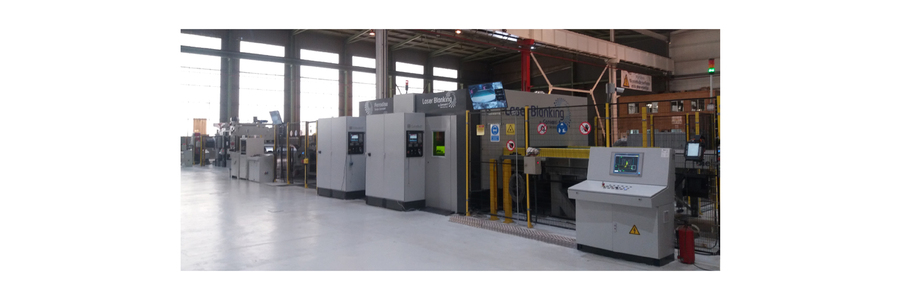Own development model for Integrated Management of Technological Innovation.
Development of a Robust, Intelligent and Portable Laser Blanking Line

The strategic objective that lies at the basis of the ROSMA project is to develop a robust, clean, intelligent and portable cutting line. More specifically, this project is aimed at LASER BLANKING lines.
New laser blanking lines, which partly replace traditional press cutting lines, have been in operation for a short time and there are currently very few lines that are operating for industrial purposes.
A total of 4 laser blanking systems are known to be in operation worldwide in the automotive sector. As a result of this relatively new system, there are many aspects to be improved on this type of line.
In the coming years, technology will undergo many improvements, mainly aimed at the following aspects:
- Increased line productivity.
- Robustness and efficiency of the line.
- Incorporation of intelligent systems pursuing a fully automated line operation.
- Incorporation of faster and more efficient stacking systems.
All the above in a clean, ergonomic and safe environment.
Thanks to their great flexibility, BLANKING LASER lines are a revolutionary alternative to traditional press cutting.
The fact that no dies or tools are needed for cutting parts means great savings in acquisition, maintenance and plant occupation, which is why both service centres and OEMs are investing heavily in this type of line. However, these new lines require improvement in many respects.
In order to solve the current problems of this type of line, the ROSMA project pursues to "Develop a concept of a robust, intelligent and portable line for cutting lines in the steel industry".
Even though applicable to many types of cutting lines, further development of this concept is especially necessary in the field of new LASER BLANKING lines.
With the new incorporations and developments resulting from the ROSMA project, this new product will yield important advances in the areas of production, flexibility, operational efficiency, product quality and investment.
The ROSMA project is a line of research that runs along three main axes:
- Enhanced portability: Avoid pits and special foundations in order to simplify and reduce the cost of installing steel cutting lines.
- Great robustness: Develop lines with zero downtimes and zero defects (reduction of defect rate) in a clean and ergonomic environment.
- Smart line: Integration of smart systems in the following areas:
o Quality: Rolling quality control systems, cutting control systems, inspection systems for surface imperfection control and cutting quality (burring), traceability of burring, deviation detection systems and position correction and compensation for optimal stacking.
o Production: Laser marking and traceability of parts.
o Platform 4.0 Integration of systems and devices on a CLOUD platform for efficient line management.